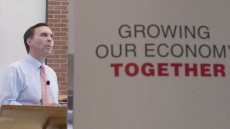TORONTO — A recent spike in the number of storefront marijuana dispensaries in parts of the country is prompting calls for the government to regulate an area not covered by current legislation.
The Canadian Association of Medical Cannabis Dispensaries estimates there are at least 350 such storefronts in Canada, with dozens opening in Toronto alone in the past few months.
Opponents say the storefront dispensaries are technically illegal and should be closed immediately.
But medical marijuana advocates say the answer is to introduce regulations to standardize the quality of the product they sell and the criteria for clients looking to buy it.
They say dispensaries fill a huge void for Canadians not covered by existing laws governing medical pot either distributed by mail or grown at home.
Advocates say they hope the burgeoning industry will be regulated when Ottawa moves to legalize marijuana next year.
The association's outgoing president, Jamie Shaw, said the recent surge has caught several municipalities by surprise even though the factors that allowed them to flourish have been in place for some time.
Shaw attributes the popularity of dispensaries to both a long-standing need for medical marijuana and existing Canadian laws that make it difficult for patients to obtain it.
"If you close down a dispensary, somebody else is going to open up because there's a need that's not being addressed," she said in a telephone interview. "Once those start opening, it becomes an avalanche. You can't keep up from an enforcement perspective."
The current law, known as the Marihuana for Medical Purposes Regulations (MMPR), allows a few dozen government-licensed distributors to send weed to approved patients by mail order only.
The system came into effect in 2014 and replaced the Medical Marihuana Access Regulations (MMAR), which gave about 30,000 patients permission to grow their own product at home. Ottawa tried to repeal that law, but a recent court injunction means those patients are still allowed to continue cultivating marijuana themselves.
Cannabis industry consultant Eric Nash said the two systems combined only serve the needs of about 80,000 Canadians, well short of the number of estimated medical marijuana users in the country. The last Canadian Alcohol and Drug Use Monitoring Survey published by Health Canada pegged the total number around 420,000 in 2011. Health Canada did not respond to requests for fresher data or comments for this story.
Nash said many patients are uncomfortable with the mail order system, feeling reluctant to disclose confidential medical information to a company.

"It's an Amazon.com-based approach. You get on the web, you order your product, it comes to your door," he said.
"That doesn't work for everyone."
Nash said the hundreds of thousands of patients not covered by existing laws can feel drawn to storefront dispensaries that may allow them to ask questions about production, smell the product and generally vet it for quality.
But Nash said existing dispensaries do not have to abide by any standards. Individual stores decide how to maintain client files, obtain products for sale and validate a patient's criteria to make a purchase in the first place.
"There's a lot more leeway there in terms of the clients that they're catering to," Nash said. "(Dispensary services) may be under the auspices of medical need, but the medical need is very broad in context. Often times you can walk in and walk out the door within five minutes with product in hand."
Some municipal politicians have voiced concerns based on the more lax approach. Cities such as Vancouver and Victoria have crafted city bylaws granting dispensaries business licences that allow them to operate, but the practice is still technically against Canadian law.
In Toronto, where no such business licensing bylaws apply, at least one councillor has spoken up. Joe Cressy said he fully supports the legalization of marijuana, but cautions that the law has not shifted yet.
"In the interim, a federal law remains in place regarding the distribution of cannabis, including specific rules for the important use of medicinal marijuana," Cressy said in an email. "That is the federal law today, and is enforceable."
Shaw said the association has developed a set of 70 guidelines and best practices for dispensaries dealing with everything from product quality control to verifying the legitimacy of a prescription.

But she said such guidelines will have little impact without input and co-operation from all orders of government, which she said could go a long way to helping other cities experiencing a spike like Toronto's.
"If you wait too long to regulate, it becomes very difficult to implement a regulatory program for a vast number of businesses that were opened without that regulatory program," she said. "Cities can only do so much."


